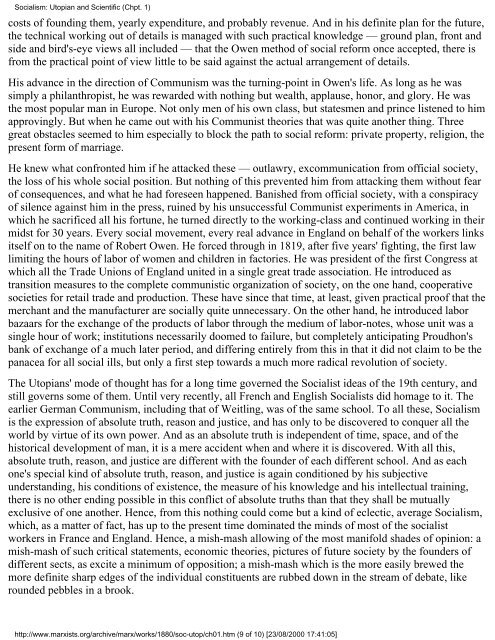Socialism: Utopian and Scientific - MIA
Socialism: Utopian and Scientific - MIA
Socialism: Utopian and Scientific - MIA
Create successful ePaper yourself
Turn your PDF publications into a flip-book with our unique Google optimized e-Paper software.
<strong>Socialism</strong>: <strong>Utopian</strong> <strong>and</strong> <strong>Scientific</strong> (Chpt. 1)costs of founding them, yearly expenditure, <strong>and</strong> probably revenue. And in his definite plan for the future,the technical working out of details is managed with such practical knowledge — ground plan, front <strong>and</strong>side <strong>and</strong> bird's-eye views all included — that the Owen method of social reform once accepted, there isfrom the practical point of view little to be said against the actual arrangement of details.His advance in the direction of Communism was the turning-point in Owen's life. As long as he wassimply a philanthropist, he was rewarded with nothing but wealth, applause, honor, <strong>and</strong> glory. He wasthe most popular man in Europe. Not only men of his own class, but statesmen <strong>and</strong> prince listened to himapprovingly. But when he came out with his Communist theories that was quite another thing. Threegreat obstacles seemed to him especially to block the path to social reform: private property, religion, thepresent form of marriage.He knew what confronted him if he attacked these — outlawry, excommunication from official society,the loss of his whole social position. But nothing of this prevented him from attacking them without fearof consequences, <strong>and</strong> what he had foreseen happened. Banished from official society, with a conspiracyof silence against him in the press, ruined by his unsuccessful Communist experiments in America, inwhich he sacrificed all his fortune, he turned directly to the working-class <strong>and</strong> continued working in theirmidst for 30 years. Every social movement, every real advance in Engl<strong>and</strong> on behalf of the workers linksitself on to the name of Robert Owen. He forced through in 1819, after five years' fighting, the first lawlimiting the hours of labor of women <strong>and</strong> children in factories. He was president of the first Congress atwhich all the Trade Unions of Engl<strong>and</strong> united in a single great trade association. He introduced astransition measures to the complete communistic organization of society, on the one h<strong>and</strong>, cooperativesocieties for retail trade <strong>and</strong> production. These have since that time, at least, given practical proof that themerchant <strong>and</strong> the manufacturer are socially quite unnecessary. On the other h<strong>and</strong>, he introduced laborbazaars for the exchange of the products of labor through the medium of labor-notes, whose unit was asingle hour of work; institutions necessarily doomed to failure, but completely anticipating Proudhon'sbank of exchange of a much later period, <strong>and</strong> differing entirely from this in that it did not claim to be thepanacea for all social ills, but only a first step towards a much more radical revolution of society.The <strong>Utopian</strong>s' mode of thought has for a long time governed the Socialist ideas of the 19th century, <strong>and</strong>still governs some of them. Until very recently, all French <strong>and</strong> English Socialists did homage to it. Theearlier German Communism, including that of Weitling, was of the same school. To all these, <strong>Socialism</strong>is the expression of absolute truth, reason <strong>and</strong> justice, <strong>and</strong> has only to be discovered to conquer all theworld by virtue of its own power. And as an absolute truth is independent of time, space, <strong>and</strong> of thehistorical development of man, it is a mere accident when <strong>and</strong> where it is discovered. With all this,absolute truth, reason, <strong>and</strong> justice are different with the founder of each different school. And as eachone's special kind of absolute truth, reason, <strong>and</strong> justice is again conditioned by his subjectiveunderst<strong>and</strong>ing, his conditions of existence, the measure of his knowledge <strong>and</strong> his intellectual training,there is no other ending possible in this conflict of absolute truths than that they shall be mutuallyexclusive of one another. Hence, from this nothing could come but a kind of eclectic, average <strong>Socialism</strong>,which, as a matter of fact, has up to the present time dominated the minds of most of the socialistworkers in France <strong>and</strong> Engl<strong>and</strong>. Hence, a mish-mash allowing of the most manifold shades of opinion: amish-mash of such critical statements, economic theories, pictures of future society by the founders ofdifferent sects, as excite a minimum of opposition; a mish-mash which is the more easily brewed themore definite sharp edges of the individual constituents are rubbed down in the stream of debate, likerounded pebbles in a brook.http://www.marxists.org/archive/marx/works/1880/soc-utop/ch01.htm (9 of 10) [23/08/2000 17:41:05]














![tyf Enf=O=n]lgg](https://img.yumpu.com/47584932/1/190x245/tyf-enfonlgg.jpg?quality=85)

